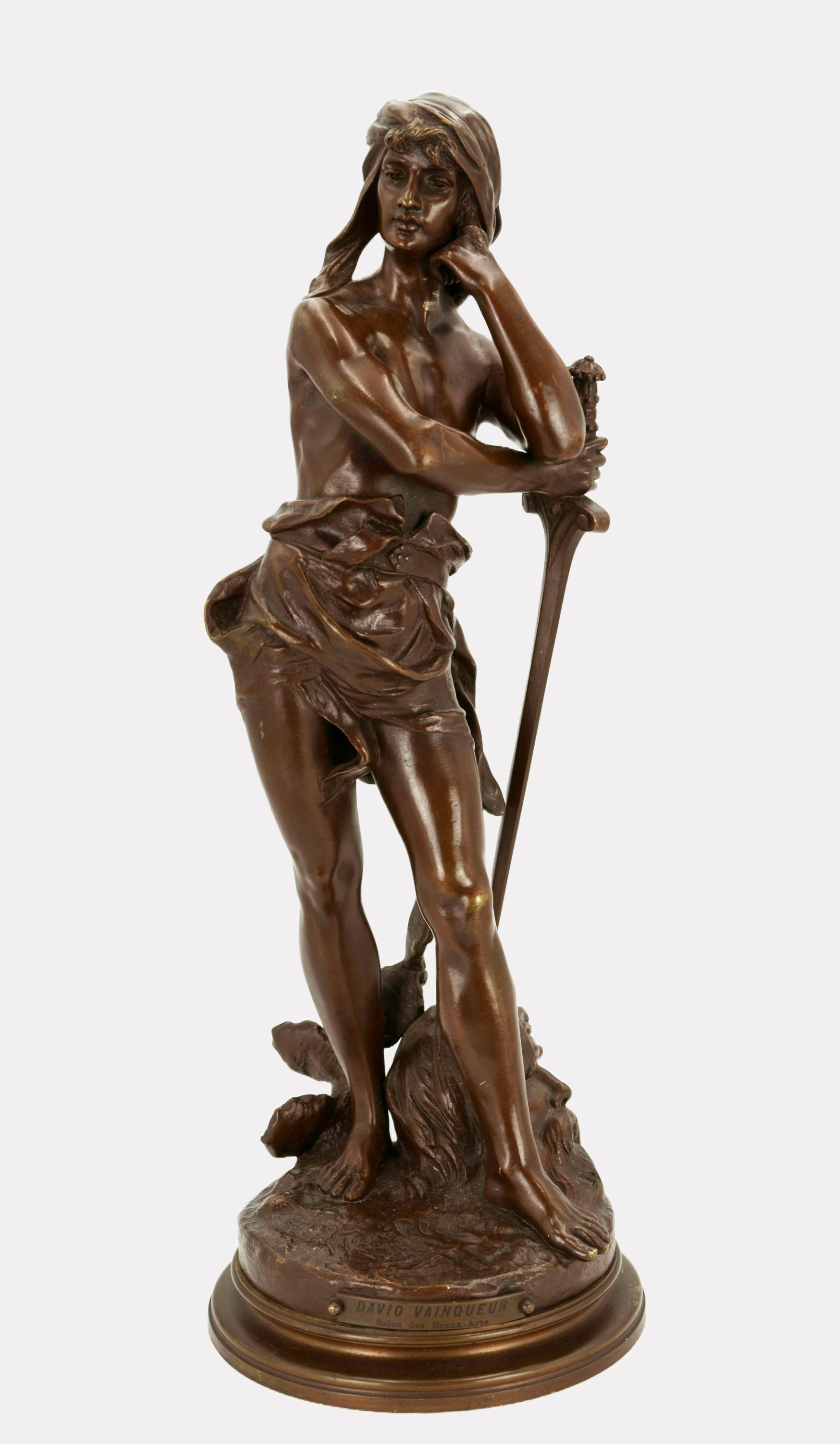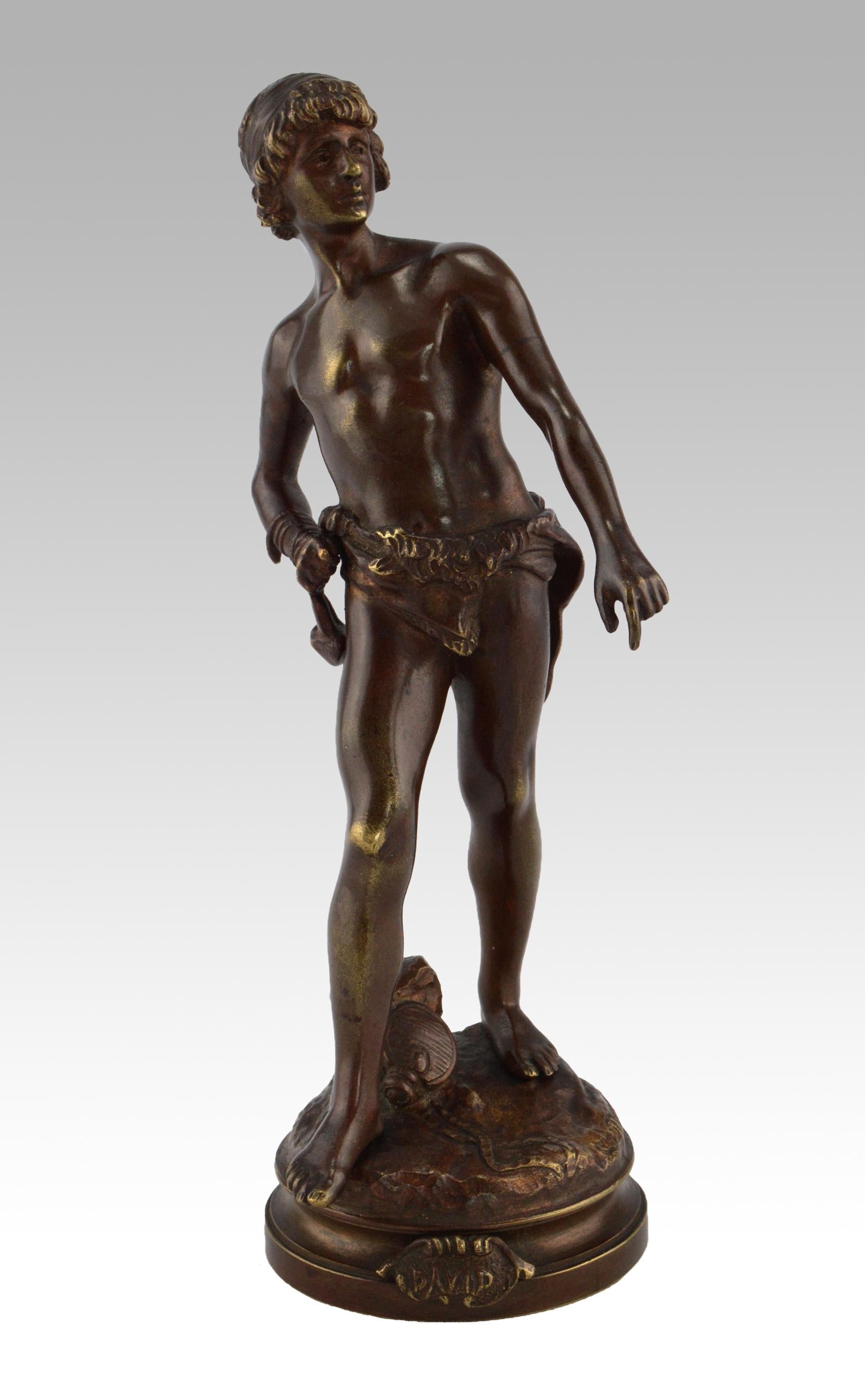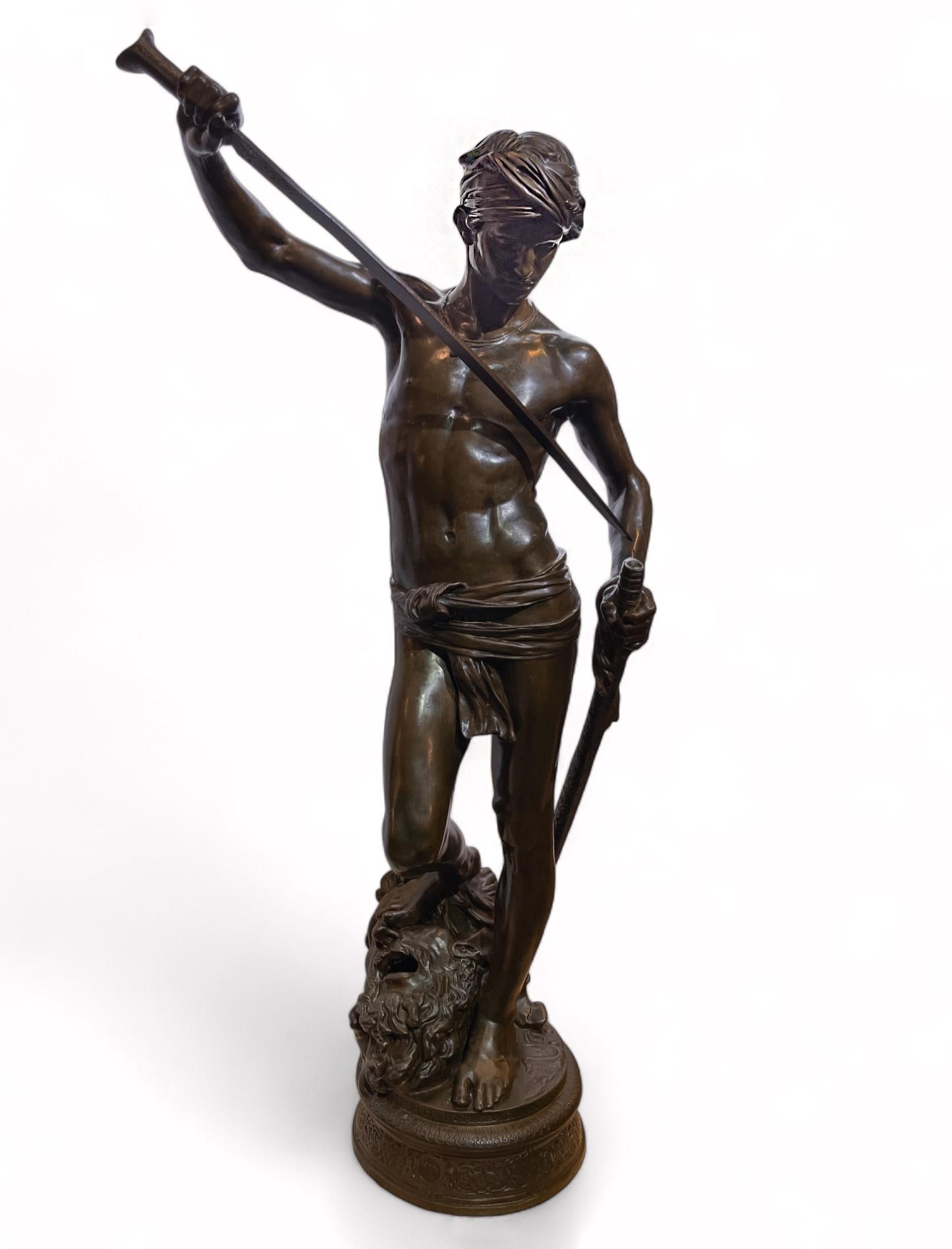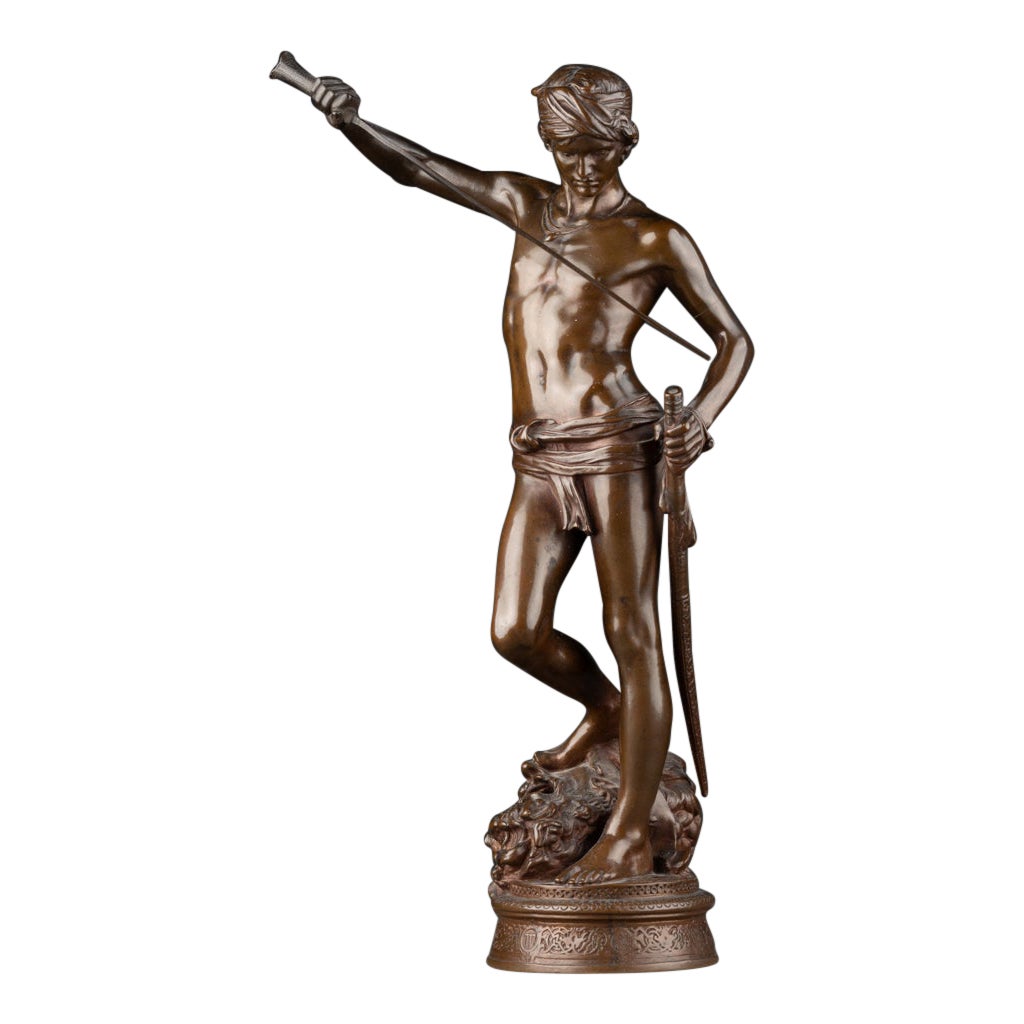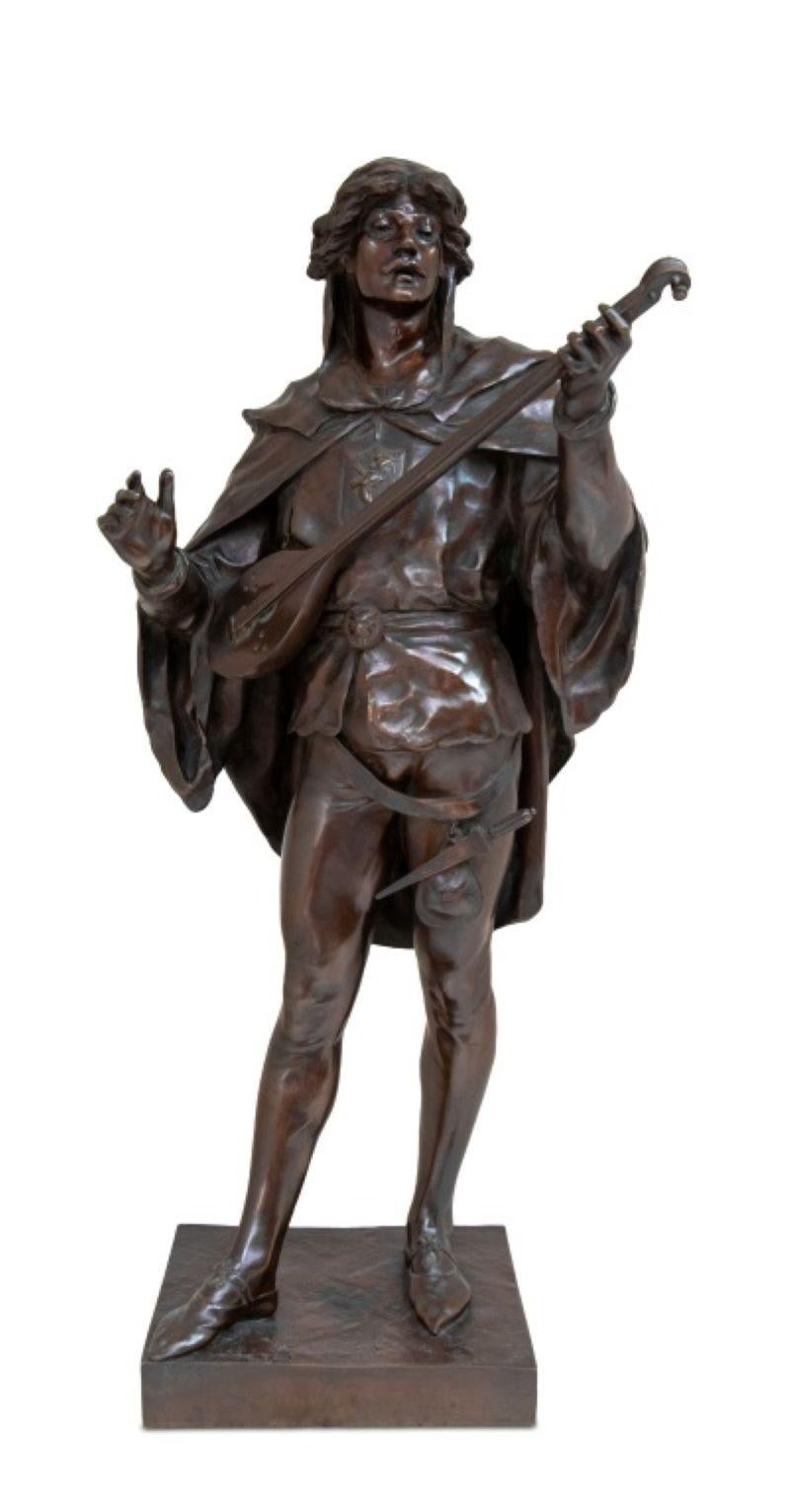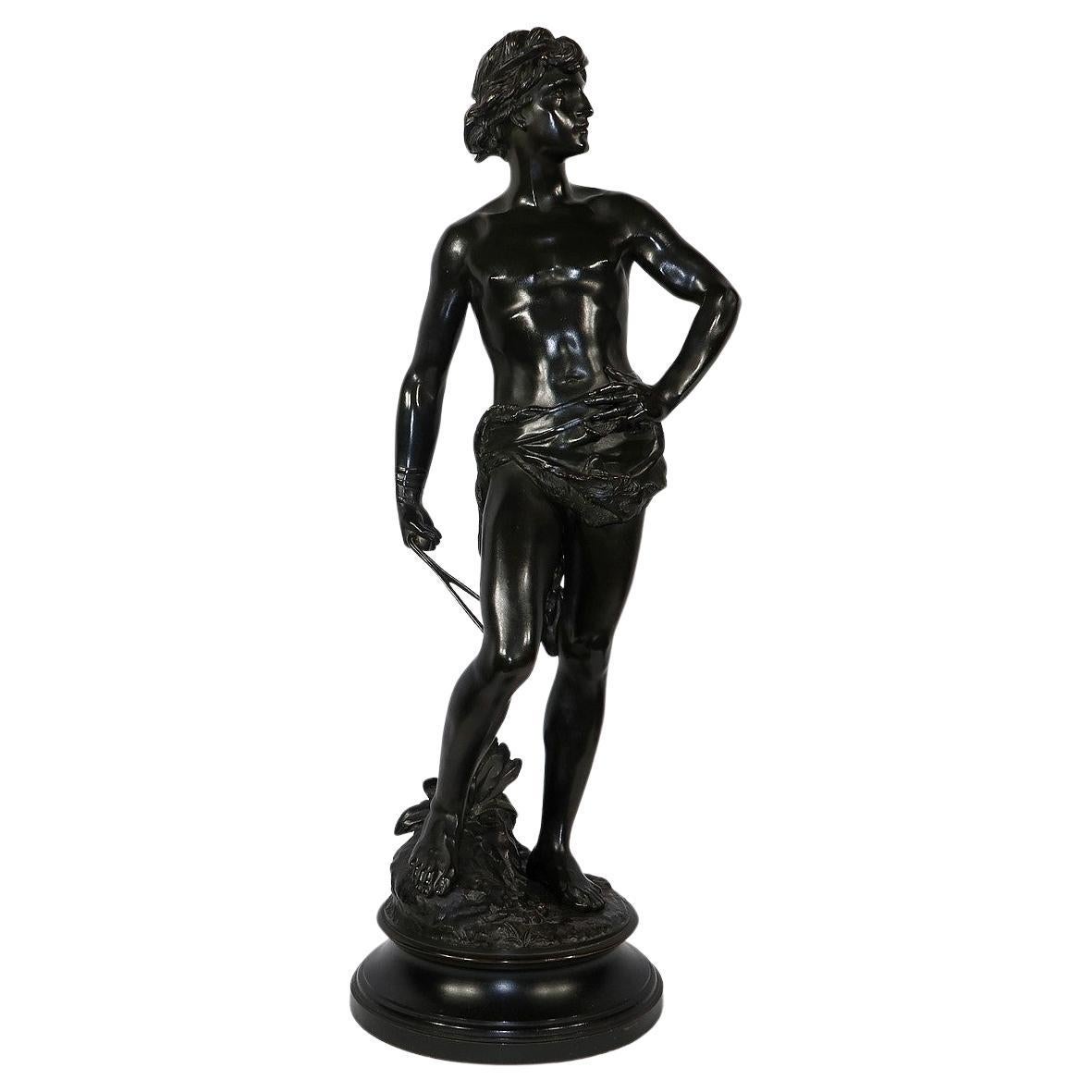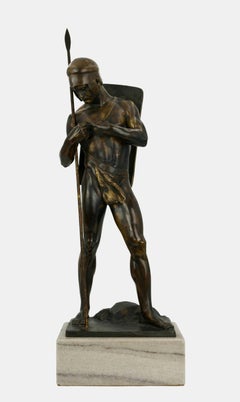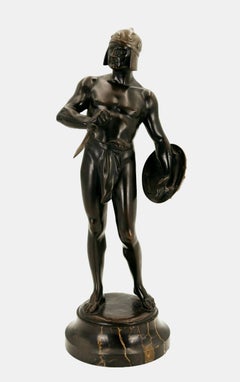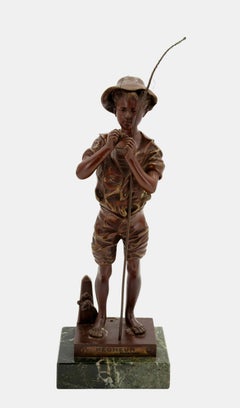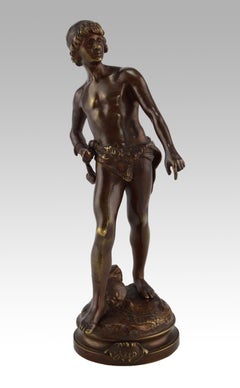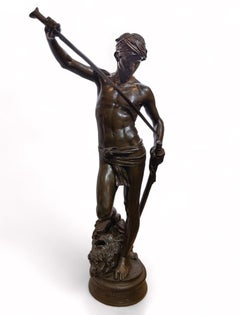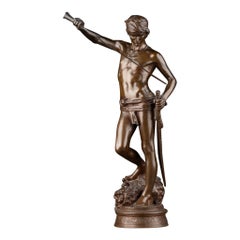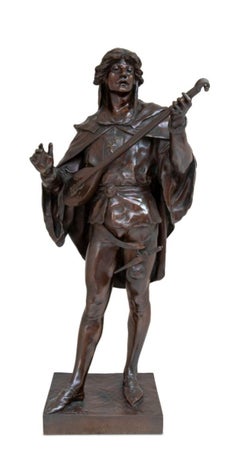Items Similar to The Victorious David / - The melancholy of the radiant hero -
Want more images or videos?
Request additional images or videos from the seller
1 of 18
Henri Honoré PléThe Victorious David / - The melancholy of the radiant hero -c. 1880
c. 1880
$4,008.18
$5,010.2320% Off
£2,963.30
£3,704.1320% Off
€3,360
€4,20020% Off
CA$5,513.19
CA$6,891.4920% Off
A$6,128.26
A$7,660.3220% Off
CHF 3,212.30
CHF 4,015.3820% Off
MX$74,840.85
MX$93,551.0720% Off
NOK 40,103.73
NOK 50,129.6620% Off
SEK 37,730.13
SEK 47,162.6620% Off
DKK 25,579.62
DKK 31,974.5320% Off
About the Item
Henri Honoré Plé (1853 Paris - 1922 Paris), The Victorious David, around 1890. Red-brown and brown patinated bronze with terrain plinth mounted on a round base. 62 cm (total height) x 22 cm (length) x 22 cm (depth), weight 13.5 kg. Signed “Henri Plé” on the plinth, inscribed “DAVID VAINQEUR SALON DES BEAUX-ARTS” on the title label and with the foundry mark of the “Société des Bronzes de Paris” and the letter “B” on the reverse.
- Patina slightly rubbed in places and with a small scratch on the spine, otherwise in excellent condition for its age
- The melancholy of the radiant hero -
David leans on the huge sword he used to slay the giant Goliath after smiting him with a slingshot. The sword rests on his immense head, which, with its long mane and beard, radiates tremendous strength even in death. But David also looks very athletic. The slight twist of his torso shows his well-proportioned body from different angles. He has a straightforward, ideal beauty, with which Plé refers to Donatello's David. Like Michelangelo's David (1504), his bronze sculpture, created around 1445, aims to illustrate an ideal physicality. Donatello's David, however, appears more youthful and displays a certain lasciviousness that is absent from Plé's work. The French artist emphasizes the elegance of the body with the elongated sword. Resting on Goliath's head, it measures David's figure almost to his shoulders and thus becomes a filigree, elegant analogy of David's body. At the same time, the overlong sword, which is difficult to wield, expresses David's determination to defeat Goliath. This will can still be seen in his slightly furrowed eyebrows.
Although David stands triumphant with his head held high in a seemingly relaxed posture, there is an inner tension that Donatello's David lacks. Rather than supporting his head with his hand in a relaxed manner after his heroic deed, he touches it with only one finger, while his concentrated inward gaze reflects on what has happened. This thoughtful, almost melancholy quality is even more evident in Plé's large version of David than in the smaller one. But it is not only the physiognomy that has been worked out more characteristically; the body has also been modeled more expressively.
About the artist
Henri Honoré Plé was the son of a porcelain painter. Inclined to sculpture, he became a student of Mathurin Moreau and exhibited as an independent artist at the Paris Salon from 1877. He received an honorable mention in 1879 and was awarded a bronze medal at the Paris World's Fair in 1900. His larger-than-life work "The First Step" is in the Musée d'Art de Lille. Plé was a member of the Société des artistes français.
GERMAN VERSION
Henri Honoré Plé (1853 Paris - 1922 Paris), Der siegreiche David, um 1890. Rotbraun und braun patinierte Bronze mit Terrainplinthe auf rundem Sockel montiert. 62 cm (Gesamthöhe) x 22 cm (Länge) x 22 cm (Tiefe), Gewicht 13,5 kg. Auf der Plinthe mit „Henri Plé“ signiert, auf dem Titelschildchen mit „DAVID VAINQEUR SALON DES BEAUX-ARTS“ bezeichnet und rückseitig mit der Gießereimarke der „Société des Bronzes de Paris“ und dem Buchstaben „B“ versehen.
- Patina stellenweise leicht berieben und am Rücken mit kleinem Kratzer, ansonsten in einem altersgemäß ausgezeichneten Zustand
- Die Melancholie des strahlenden Helden -
In elegant gelassener Haltung stützt sich David auf das immense Schwert, mit dem er den Riesen Goliath getötet hat, nachdem er ihn mit der Steinschleuder zu Fall gebracht hatte. Das Schwert ruht auf dem immensen Kopf, der mit seiner langen Mähne und dem Bart noch im Tod gewaltige Kräfte ausstrahlt. Aber auch David wirkt überaus athletisch. Die leichte Drehung des Oberkörpers bringt seinen wohlproportionierten Körper aus mehreren Ansichten zur Geltung. Er weist eine geradewegs ideale Schönheit auf, womit sich Plé auf den David Donatellos bezieht. Seine gegen 1445 geschaffene Bronzeplastik zielt, ebenso wie Michelangelos David (1504), auf die Veranschaulichung einer idealen Körperlichkeit. Donatellos David wirkt allerdings jugendlicher und weist eine gewisse Laszivität auf, die bei Plé fehlt. Der französische Künstler unterstreicht die Eleganz des Körpers durch das überlang wirkende Schwert. Auf dem Kopf Goliaths ruhend durchmisst es Davids Gestalt beinahe bis zu den Schultern und wird auf diese Weise zur filigran-eleganten Analogie von Davids Körper. Zugleich bringt das überlange und daher nur schwer zu führende Schwert Davids Willenskraft zum Ausdruck, die ihn Goliaths hat bezwingen lassen. Diese Entschlossenheit ist seinen leicht zusammengezogenen Augenbraunen noch abzulesen.
Obwohl David erhobenen Hauptes als Sieger in einer scheinbar gelassenen Haltung dasteht, ist ihm doch eine innere Anspannung abzulesen, die Donatellos David fehlt. Er stützte seinen Kopf nach der vollbrachten Heldentat nicht auf entspannte Weise mit der Hand ab, sondern berührt ihn mit nur einem Finger, während der konzentrierte nach innen gerichtete Blick das Geschehene reflektiert. Dieser nachdenkliche, beinahe melancholische Zug kommt bei Plés großer Ausführung des Davids noch weit mehr zur Geltung als bei der kleineren Version. Aber nicht allein die Physiognomie ist charakteristischer herausgearbeitet, auch der Körper ist ausdrucksstärker durchmodelliert.
zum Künstler
Henri Honoré Plé war der Sohn eines Porzellannmalers. Der Bildhauerei zugeneigt wurde er Schüler Mathurin Moreaus und stellte als selbstständiger Künstler ab 1877 im Pariser Salon aus. 1879 wurde ihm eine ehrenvolle Erwähnung zuteil. Auf der Pariser Weltausstellung des Jahres 1900 erhielt er eine Bronzemedaille. Sein überlebensgroßes Werk, „Der erste Schritt“, befindet sich im Kunstmuseum von Lille. Plé war Mitglied der Société des artistes français.
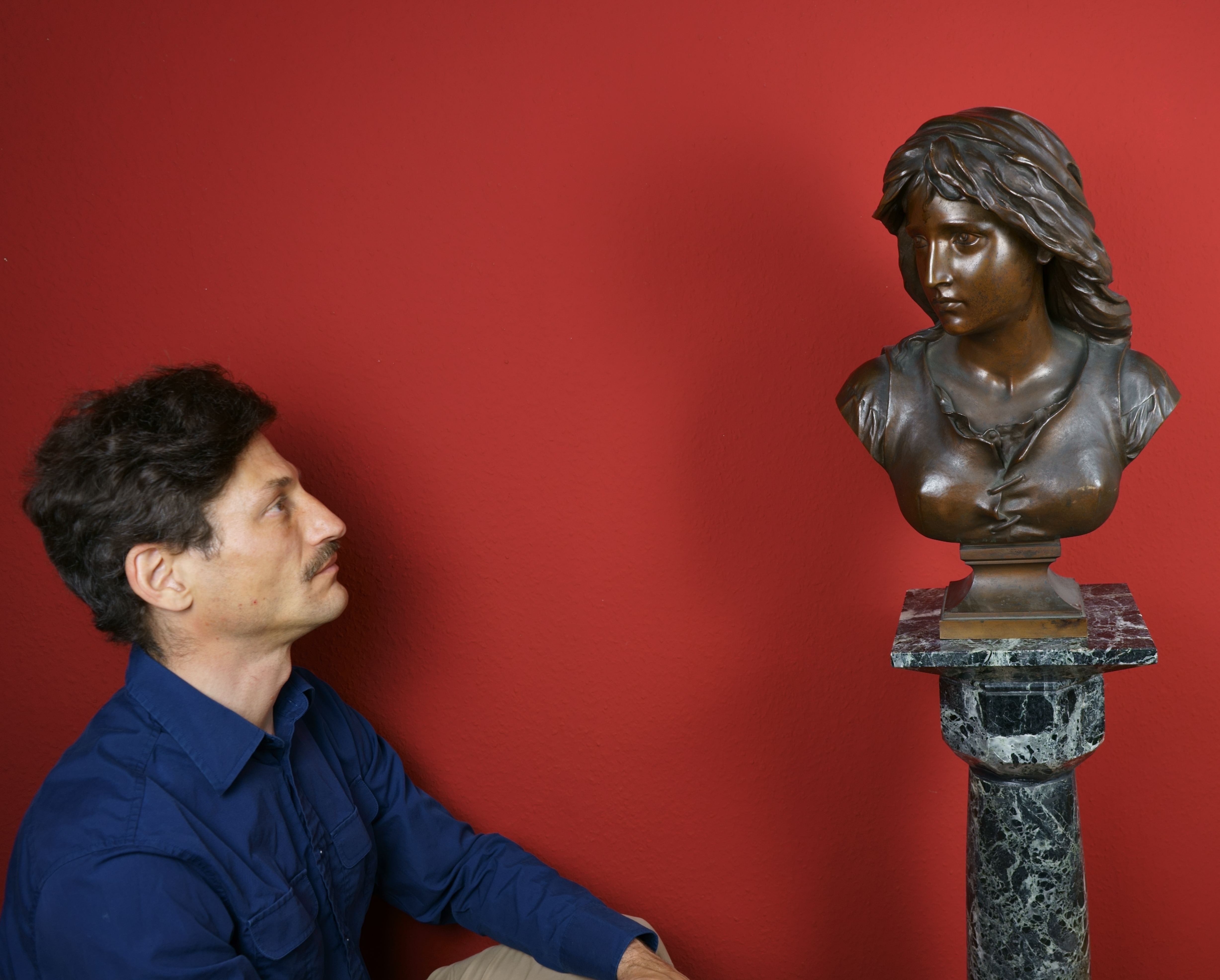
About the Seller
5.0
Vetted Professional Seller
Every seller passes strict standards for authenticity and reliability
Established in 2014
1stDibs seller since 2023
21 sales on 1stDibs
- ShippingRetrieving quote...Shipping from: Berlin, Germany
- Return Policy
Authenticity Guarantee
In the unlikely event there’s an issue with an item’s authenticity, contact us within 1 year for a full refund. DetailsMoney-Back Guarantee
If your item is not as described, is damaged in transit, or does not arrive, contact us within 7 days for a full refund. Details24-Hour Cancellation
You have a 24-hour grace period in which to reconsider your purchase, with no questions asked.Vetted Professional Sellers
Our world-class sellers must adhere to strict standards for service and quality, maintaining the integrity of our listings.Price-Match Guarantee
If you find that a seller listed the same item for a lower price elsewhere, we’ll match it.Trusted Global Delivery
Our best-in-class carrier network provides specialized shipping options worldwide, including custom delivery.More From This Seller
View AllThe Victorious David / - The melancholy of the radiant hero -
Located in Berlin, DE
Henri Honoré Plé (1853 Paris - 1922 Paris), The Victorious David, around1890. Red-brown and brown patinated bronze with terrain plinth mounted on a round base. 42 cm (total height) x...
Category
1890s Realist Figurative Sculptures
Materials
Bronze
$1,815 Sale Price
20% Off
Spear Fighter / - The Fighter's Concentration -
Located in Berlin, DE
Ludwig Eisenberger (active in Berlin between 1895-1920), Spear Fighter, around 1910. Brown patinated bronze with residual gilding on a cast terrain plinth with marble base (8 cm high...
Category
1910s Realist Nude Sculptures
Materials
Bronze
Gladiator ready for battle / - Ready for anything -
By Bruno Zach
Located in Berlin, DE
Bruno Zach (1891 Zhitomir - 1945 Vienna), Gladiator ready for battle, c. 1930. Blackish patinated bronze with silver-plated helmet, shield rim and shield pommel mounted on a fluted m...
Category
1930s Art Deco Nude Sculptures
Materials
Bronze
Pecheur / - Full of anticipation -
Located in Berlin, DE
Adolphe Jean Lavergne (1863-1928), Pecheur, c. 1900. Brown patinated bronze with rectangular cast plinth on a green marble base (3 cm high), total height with hinge 37 cm, width 9 cm, depth 8 cm, weight 2.9 kg, signed “Lavergne” on the plinth.
- Base with old drilling and a few oxidized areas, patina occasionally rubbed, somewhat stained in the folds.
- Full of anticipation -
This bronze is the larger, highly detailed version of the fisherman that made Parisian artist Adolphe Jean Lavergne famous. In preparation for fishing, the boy prepares his rod before heading out to sea. The attachment of the iron ring and the rope behind him suggest a quay wall and a boat moored there. However, the depiction is entirely focused on the actual action of the young fisherman: With equal skill and concentration, he bends a hook to connect it to the fishing line. The contrast with his casual clothing, the loose-fitting trousers, the open shirt with its "wild" folds, and, last but not least, the sun hat boldly perched on his neck, reinforces the impression of the attentive care with which he goes about his work. His gaze makes him appear absorbed, as if he has forgotten the world around him and yet he is visibly filled with anticipation of fishing.
GERMAN VERSION
Adolphe Jean Lavergne (1863-1928), Pecheur, um 1890. Braun patinierte Bronze mit rechteckiger gegossener Plinthe auf grünem Marmorsockel (3 cm Höhe), Gesamthöhe mit Angel 37 cm, Breite 9 cm, Tiefe 8 cm, Gewicht 2,9 kg, auf der Plinthe mit „Lavergne“ signiert.
- Sockel mit alter Bohrung und wenigen oxidierten Stellen, Patina mitunter berieben, in den Falten vereinzelt etwas fleckig.
- Voller Vorfreude -
Die Bronzefigur ist die größere äußerst detaillierte Ausführung des Fischers, mit dem der Pariser Künstler Adolphe Jean Lavergne bekannt geworden ist. In Vorbereitung auf das Fischen präpariert der Junge die Angel...
Category
1890s Realist Figurative Sculptures
Materials
Bronze
$687 Sale Price
20% Off
Crusader with shield and mace / - Ready to strike -
Located in Berlin, DE
Josef Moest (1873 Cologne - 1914 Rath), Crusader with shield and mace, around 1910. Bronze on a black marble pedestal (19 cm high). 57.5 cm (total height) x 21 cm (width) x 12 cm (de...
Category
1910s Realist Figurative Sculptures
Materials
Bronze
Psyche / - Fulfilled longing -
Located in Berlin, DE
Jan Jozef Jaquet (1822 Antwerp - 1898 Brussels), Psyche, 1847. Black-brown and brown patinated bronze on a cast base. 30 cm (height) x 22 cm (width) x 12 cm (depth), weight 5 kg. Ver...
Category
1840s Realist Figurative Sculptures
Materials
Bronze
$1,431 Sale Price
20% Off
You May Also Like
19th Century bronze sculpture of David
By Louis Auguste Moreau
Located in Nr Broadway, Worcestershire
Louis Auguste Moreau
French, (1855-1919)
David
Bronze, signed
Height: 7.5 inches
Width: 3.25 inches
Depth: 3 inches
Louis Auguste Moreau was born in Dijon, France in 1855 into a fam...
Category
19th Century Victorian Figurative Sculptures
Materials
Bronze
David Slaying Goliath Large Figural Bronze Statue by Antonin Mercie
By Marius Jean Antonin Mercié
Located in New York, NY
The base marked "A. Mercie" and "506 F. Barbenienne, Fondeur, Paris" ad "A. Collas" "Reduction Mecanique."
The dazzling David, a prolific subject amongst sculpture artists beginning...
Category
Late 19th Century Academic Figurative Sculptures
Materials
Bronze
A. Mercié : "David", small model in patinated bronze End XIXth/ early XXth c.
By Antonin Mercie
Located in SAINT-OUEN-SUR-SEINE, FR
Antonin Mercié (1845-1916, France) : "David"
Nuanced brown patinated bronze sculpture showing David winning Goliath
Rare small model in the edition of 7 different sizes
Signed : "...
Category
Antique 1890s French Romantic Figurative Sculptures
Materials
Bronze
Emile Picault "Joueur de Luth" Patinated Bronze
Located in Astoria, NY
Emile-Louis Picault (French,1833-1915) "Joueur de Luth" [Lute Player] Patinated Bronze Figural Sculpture, late 19th century, the standing figure in Renaissance style costume playing ...
Category
Late 19th Century Other Art Style Figurative Sculptures
Materials
Bronze
Important Bronze sculpture “David”, by A. Gaudez – Late 19th century
By Adrien Étienne Gaudez
Located in HÉRIC, FR
Magnificent bronze cast with a black and green patina, signed Adrien Etienne Gaudez (1845-1902), a renowned French sculptor, gold medalist at the 1889 Paris World's Fair.
This 67 cm ...
Category
Antique Late 19th Century French Figurative Sculptures
Materials
Bronze
Vainqueur (Victorious) French Bronze by E. Marioton (1857-1933)
Located in Atlanta, GA
Vainqueur (Victorious) A Very Fine French Bronze by Eugene Marioton (1857-1933), excellent condition, depicting a young warrior with right arm extended holding a laurel branch- left ...
Category
Antique 1850s French Figurative Sculptures
Materials
Bronze
More Ways To Browse
Societe Des Bronzes De Paris
Antique Long Sword
Large Torso Sculptures
Bronze Sculpture Signed Moreau
Mathurin Moreau Bronzes
David Michelangelo Sculpture
Large German Porcelain Figure
Antique Deed
David And Goliath
David Goliath
Bronze Age Sword
Henri Honore Ple
Henri Ple
Henri Ple Sculpture
Antique Slingshot
Panther Danel
Paul Granlund
Peter Max Cookie Jar
